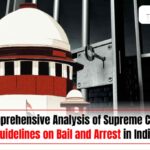Section 437 of the Code of Criminal Procedure of 1973 empowers the Court to impose certain conditions deeming fit at the time of granting bail.
The Criminal Procedure Code elucidates the bail process and how it is obtained. However, it does not define bail. To get a glimpse of the law, one needs to go deeper to section 2(a) of Criminal Procedure Code wherein it says that bailable offense means an offense which is shown as bailable in the First Schedule or which is made bailable by any other law for the time being enforce, and non-bailable offense means any other offense.
Thus, section 2(a) of Criminal Procedure Code 1973 talks about schedule which refers to all the offenses under the Indian Penal Code and puts them into bailable and on bailable categories which have been determined according to the nature of the crime. For instance, all serious offenses like offenses punishable with imprisonment for three years or more have seen considered as non bailable offenses, all other offenses have been kept bailable offenses.
You may contact me for consultation or advice by visiting Contact Us








